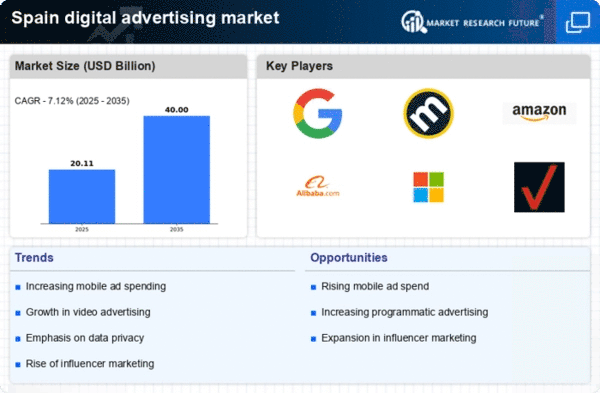Growth of E-commerce
The rise of e-commerce in Spain has been a pivotal driver for the digital advertising market. As online shopping continues to gain traction, businesses are increasingly allocating budgets to digital channels to reach consumers effectively. In 2025, e-commerce sales in Spain are projected to exceed €50 billion, indicating a robust market that necessitates targeted advertising strategies. This shift compels brands to invest in digital platforms, enhancing their visibility and engagement with potential customers. Consequently, the digital advertising market is experiencing a surge in demand for innovative ad formats and personalized content that resonate with online shoppers. The integration of e-commerce with social media platforms further amplifies this trend, as brands leverage social commerce to drive sales directly through advertisements. Thus, the growth of e-commerce is likely to continue shaping the landscape of the digital advertising market in Spain.
Shift Towards Video Content
The increasing consumption of video content in Spain is reshaping the digital advertising market. Video advertising is becoming a preferred format for brands seeking to engage audiences effectively. In 2025, video ad spending is projected to reach €1.5 billion, representing a substantial portion of the overall digital advertising budget. This shift is driven by the popularity of platforms like YouTube and social media channels that prioritize video content. Advertisers are recognizing the potential of video to convey messages more dynamically and memorably, leading to higher engagement rates. Additionally, the rise of short-form video content, particularly on platforms like TikTok, is encouraging brands to adapt their strategies to capture the attention of younger demographics. Consequently, the shift towards video content is likely to continue influencing the digital advertising market, prompting brands to innovate and diversify their advertising approaches.
Increased Mobile Device Usage
The proliferation of mobile devices in Spain is significantly influencing the digital advertising market. With over 80% of the population owning smartphones, advertisers are compelled to optimize their campaigns for mobile platforms. This trend is reflected in the increasing share of mobile advertising, which is expected to account for approximately 60% of total digital ad spending in 2025. The convenience and accessibility of mobile devices allow consumers to engage with brands anytime and anywhere, making mobile advertising a critical component of marketing strategies. Furthermore, advancements in mobile technology, such as 5G connectivity, enhance user experiences and enable richer ad formats. As a result, businesses are likely to invest more in mobile-centric campaigns, thereby driving growth in the digital advertising market. The emphasis on mobile optimization is essential for brands aiming to capture the attention of consumers who are frequently on the move.
Regulatory Changes and Data Privacy
The evolving landscape of data privacy regulations in Spain is a crucial driver for the digital advertising market. With increasing scrutiny on data collection practices, businesses must navigate compliance with regulations such as the General Data Protection Regulation (GDPR). This regulatory environment compels advertisers to adopt transparent data practices and prioritize consumer consent. As a result, the digital advertising market is witnessing a shift towards privacy-centric strategies, where brands focus on building trust with consumers. The emphasis on ethical data usage may lead to increased investment in first-party data collection methods, enhancing the effectiveness of targeted advertising. Moreover, companies that successfully adapt to these regulatory changes are likely to gain a competitive edge in the digital advertising market, as consumers become more discerning about their data privacy.
Emergence of Artificial Intelligence
The integration of artificial intelligence (AI) technologies is transforming the digital advertising market in Spain. AI-driven tools enable advertisers to analyze vast amounts of data, optimize campaigns in real-time, and deliver personalized content to consumers. This technological advancement is expected to enhance the efficiency and effectiveness of advertising strategies. In 2025, it is anticipated that AI will account for over 30% of digital ad spending, reflecting its growing importance in the industry. The ability to leverage machine learning algorithms allows brands to predict consumer behavior and tailor their messaging accordingly. Furthermore, AI can automate various aspects of advertising, from ad placement to performance analysis, freeing up resources for creative development. As a result, the emergence of artificial intelligence is likely to play a pivotal role in shaping the future of the digital advertising market, driving innovation and improving return on investment.
















